|
|
|
Sort Order |
|
|
|
Items / Page
|
|
|
|
|
|
|
| Srl | Item |
| 1 |
ID:
140896


|
|
|
|
|
| Summary/Abstract |
This paper asks where and why Palestinian protests take place and how particular manifestations of territorial dislocation affect the dynamics of Palestinian political activism. Political, social and territorial transformations over the Oslo period had resulted in the fragmentation of Palestinian resistance, a development that had become most evident during the second intifada through the absence of mass-based non-violent protest. Israel’s complex control over Palestinian territory and mobility has been a key factor in driving this fragmentation. In contrast to checkpoints, forbidden roads, and closures, the construction of the Separation Wall had a very different impact, and amid the continuation of a violent and fragmented uprising, it presented a focal point for cohesive organised non-violent local protest. This paper examines to what extent the construction of the Wall has engendered a different type of protest, conception of activism and new forms of cooperation, that break the trend of the second intifada.
|
|
|
|
|
|
|
|
|
|
|
|
|
|
|
|
| 2 |
ID:
140885
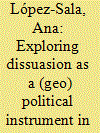

|
|
|
|
|
| Summary/Abstract |
This article analyses the evolution and implementation of Spanish policy to control irregular immigration via maritime routes over the past two decades. Starting from the premise that this policy was based on a comprehensive strategy of dissuasion to prevent, contain and hinder the arrival and settlement of irregular immigrants, for analytical purposes the article introduces the concepts of preventive dissuasion, coercive dissuasion and repressive dissuasion to describe actions of diverse categories, hierarchy and scope that sequentially and simultaneously shape and structure the logic behind dissuasion used in different “territorial settings”. Spain has deployed a great deal of this policy – mainly preventive and coercive dissuasion strategies – through bilateral agreements and formal practices with African countries. This article is based on fieldwork carried out between 2008 and 2012 in different Spanish border areas, including interviews with different actors and visits to border posts and surveillance installations.
|
|
|
|
|
|
|
|
|
|
|
|
|
|
|
|
| 3 |
ID:
140892


|
|
|
|
|
| Summary/Abstract |
Based on the notions of ‘popular geopolitics’ and ‘practical geopolitics’, this article explores how China’s geopolitical strategies are represented and reproduced by the popular songs in the CCTV (China Central Television) Spring Festival Gala during the past thirty years (1983–2013). Drawing on the (con)textual and visual analysis of 539 popular songs, how geopolitical knowledges are represented and reproduced by these songs and how these songs are involved with China’s geopolitical strategies are analysed. The main argument of this article indicates that the official regulated popular songs in the annual Gala can be considered as important constitutions of China’s state apparatus which aim at propagandising and legitimating the official geopolitical strategies on both internal and international affairs. As research of the geopolitical engagements of China’s popular music, this article might also be read as a contribution to wider literatures on popular and practical geopolitics from a non-Western perspective.
|
|
|
|
|
|
|
|
|
|
|
|
|
|
|
|
| 4 |
ID:
140895
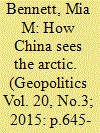

|
|
|
|
|
| Summary/Abstract |
In May 2013, China gained observer status in the Arctic Council, exemplifying its growing legitimacy as a regional actor in the eyes of the eight countries with territory north of the Arctic Circle. Yet since China remains an extraregional state without territory in the Arctic, Chinese officials continue to bolster their state’s legitimacy as an Arctic stakeholder through two spatially inconsistent but mutually reinforcing grand regional narratives. On the one hand, Chinese officials recognize the salience of territory and presence in the Arctic, underscoring their country’s “near-Arctic” location and polar scientific expeditions. On the other hand, officials depict the Arctic as a maritime, global space where climate change has potential ramifications for the entire planet. Significantly, these reframings are affecting intraregional states’ perceptions of the Arctic, demonstrating how a region’s territorial extent, symbolic meaning, and institutional form emerge through the ongoing conversation between extraregional and intraregional narratives.
|
|
|
|
|
|
|
|
|
|
|
|
|
|
|
|
| 5 |
ID:
140884
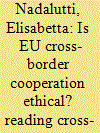

|
|
|
|
|
| Summary/Abstract |
This article applies Simone Weil’s philosophical concept of ‘uprootedness’ and the ‘14 needs of the soul’, set out in her 1943 book ‘The Need for Roots’, to the empirical case study of the border ‘Italy-Slovenia’ considered within Programme 2007–2013. A multi-dimensional qualitative approach that relies on an extensive literature, consultation of primary sources and semi-structured interviews carried out between October 2013 and February 2014 has been adopted.The article questions why does cross-border-cooperation often fail to develop an ‘integrated’ border territory and a cohesive ‘moral’ community? Conversely, why does social fragmentation emerge from cross-border-cooperation? It is argued that while the EU (Commission) has focused on initiatives and projects in order to achieve regional, economic border integration, it has instead failed to develop an ‘ethical framework’ for promoting a ‘rooted’ integrated borderland and a cohesive moral community.
|
|
|
|
|
|
|
|
|
|
|
|
|
|
|
|
| 6 |
ID:
140893
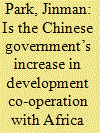

|
|
|
|
|
| Summary/Abstract |
Over the past few decades, the rapid growth of China’s development co-operation with Africa has attracted worldwide attention. Some people assert that development co-operation in Africa has contributed to the general development of the continent; however, others, many of whom are scholars and Western politicians, dispute its influence on Africa and are suspicious of its real motives, noting its exploitation of natural resources and increasing market encroachment. This study will discuss the expansion of China’s development co-operation with African countries from the perspective of Sinocentrism, as there appears to be an absence of a superordinate concept or ideology that extensively encompasses and interconnects the diverse explications from existing studies. Henceforth, this research aims to contribute towards examining whether Sinocentrism could be a possible superordinate concept of existing studies. As such, it could be helpful in better understanding Chinese development co-operation in Africa, by examining China’s history and its recent path in Africa as well as its international relations.
|
|
|
|
|
|
|
|
|
|
|
|
|
|
|
|
| 7 |
ID:
140890


|
|
|
|
|
| Summary/Abstract |
The purpose of this study is to investigate the importance of population and language for China’s Central Asian policy through soft power resources. This article will evaluate the steps China has taken since the disintegration of the USSR to remove the perception of threat felt by the peoples of the region. We will argue that China is trying to turn its population, which is seen as the biggest threat it poses, into an advantage for itself. Moreover, it will be pointed out that China is actively using its spiritual heritage to eliminate these negative perceptions and in this regard the objectives of Confucius schools will be assessed. The study will elaborate on the fact that China is using these schools and its population as important tools in expanding its area of influence in regional and international platforms. As a result of the study, it was revealed that although the soft power of China, which is popular in academic circles and with officials, was sometimes successful in practice, there were certain limitations in its population and language policies.
|
|
|
|
|
|
|
|
|
|
|
|
|
|
|
|
| 8 |
ID:
140897
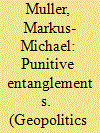

|
|
|
|
|
| Summary/Abstract |
This paper analyses the export-import business of penal policies that accompanies the “war on transnational street gangs” between the United States and Central America. It argues that far from being a unidirectional export of punitive politics from the United States towards Central America, many of these punitive exports travel “back home”. This creates transnational punitive entanglements that contribute to the contingent convergence of punitive geopolitics and domestic politics in the guise of a transnational penal apparatus that integrates law enforcement agencies and military forces, securocratic epistemic communities and national political entrepreneurs into a functionally cohesive but decentred transnational security structure engaged in a multilayered punitive containment of transnational street gangs across the Americas.
|
|
|
|
|
|
|
|
|
|
|
|
|
|
|
|
| 9 |
ID:
140886


|
|
|
|
|
| Summary/Abstract |
Recent geopolitical changes and the strengthening of the security/economy nexus have multiplied the types and functions of territorial borders in the Baltic Sea Region (BSR). These borders have been insufficiently addressed in previous research even though macro-regions cross over multiple borders, which are highly affected by geopolitical events and conflicts. This paper contributes to the debate about multiple borders with particular emphasis on the question how de- and re-bordering affect the regionalisation process in practice and how it influences the cooperation within the BSR. The results, which are based on a discourse analysis of a corpus of documents, show that the region-building process in the BSR itself creates new borders, which define the level of the member state’s political participation in the region. The governance of macro-regions would benefit from the development of such analytical frameworks that take into account the impact of the multitude of borders on the practical level.
|
|
|
|
|
|
|
|
|
|
|
|
|
|
|
|
| 10 |
ID:
140887


|
|
|
|
|
| Summary/Abstract |
The article examines the geopolitical developments in the South Caucasus after the collapse of the USSR in the context of the Russian-American geopolitical struggle. Armenia, Azerbaijan and Georgia, three recognised states of this region, should not only solve a set of complex problems such as to pass effectively through the difficult path of state-building, to respond adequately to the developments of the Russian-American struggle, but they should also take into consideration the impact of that struggle on the resolution of the conflicts in the region. The article aims to disclose the patterns and the peculiarities of geopolitical struggle in the South Caucasus, its impact on the process of resolving the Nagorno-Karabakh conflict, that recently gained more significance, and also the obstacles and perspectives of the resolution of this conflict.
|
|
|
|
|
|
|
|
|
|
|
|
|
|
|
|
|
|
|
|
|